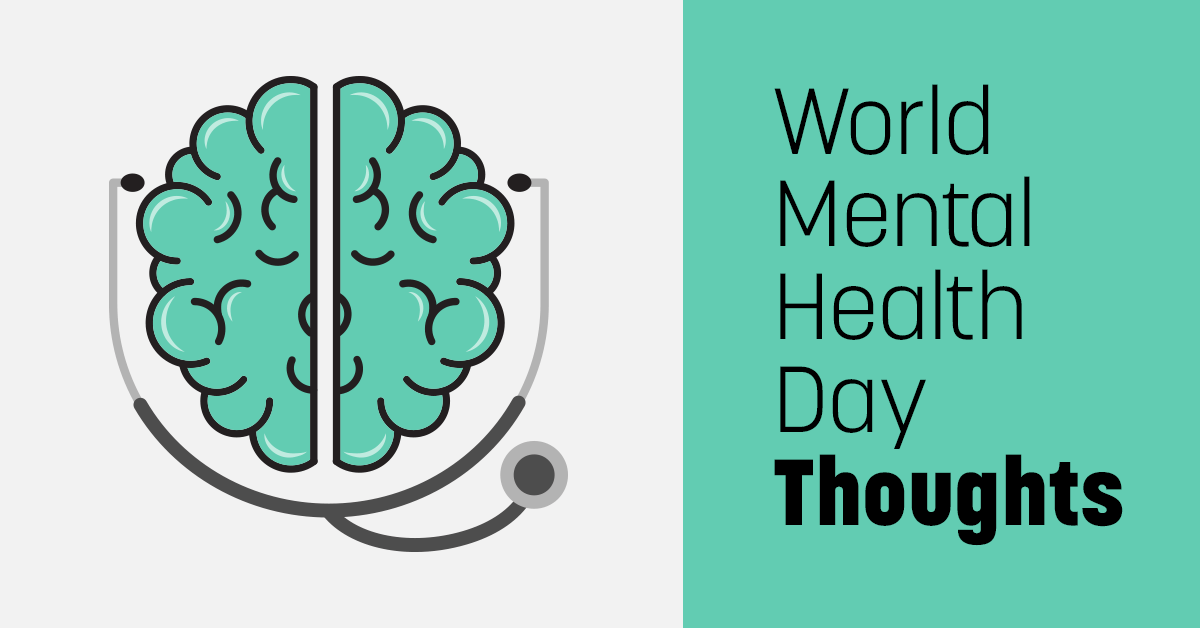
In recognition of World Mental Health Day on October 10, here are some thoughts about the issue:
I know what mental health is, but I want to hear you say it.
There are a couple ways to define it. One way is that it’s basically an overall look at how you’re doing – emotionally, psychologically, and socially. Part of being mentally healthy is about proactively creating a positive environment for yourself.
Mental health issues are incredibly common. One in six adults in the US are living with mental illness. So it’s clear we need help.
What causes people to struggle with their mental health?
Lots of things. Some factors are tied to genetics or personality traits. Others can be tied to your specific environment. Like, how you’re treated at work or in social settings. There’s also your physical health and safety, your employment status, any discrimination you’re experiencing, or trauma you’ve gone through in the past.
How are millennials doing, mental health-wise?
Not great. Millennials are reporting higher levels of mental health issues than older generations. Teens and college students are also experiencing rising rates of depression and anxiety. Women in particular are prone to things like depression.
Why is this happening?
We don’t know. The rise in depression and anxiety symptoms has been going on for decades, and keeps getting higher. Experts have a few ideas. Like…
- Perfectionism…younger people have really high standards for themselves – and lots of self-criticism. Some of it’s self-imposed. Some of it’s coming from social pressures. Speaking of…
- Social media…it’s not helping. Insta is not real life. Scrolling through your feed – and comparing yourself to others – has been linked to depression.
- External conditions…mental illness can be tied to things ranging from stress at work to your socioeconomic status. Experience with gender-based violence may also help explain why women are more likely than men to experience depression and anxiety.
- Physical health… your physical and mental health are related. Researchers think what you eat could impact how you feel. Meanwhile, eating disorders – an especially deadly mental health illness – are still on the rise.
What can I do to take better care of my mental health?
If you think you’re handling a mental health condition, do not self-diagnose. Get treatment from someone who’s trained to help. And ask that person to help you find treatment facilities
if need be. If you’re looking for an affordable psychiatrist or therapist, check with your insurance provider.
In addition to that, here are some tips that may improve your mental health:
- Physical health: Don’t skip over this one. Eating well, exercising, and sleep have each been tied to better mental health outcomes – and the link can go both ways. You don’t need to join a fancy gym to start taking care of your mental health. Run, don’t walk – but walking can help, too.
- Meditation: There’s evidence that hitting pause for a few minutes a day can seriously improve your mental health. Mindfulness meditation in particular. So breathe. Headspace is one way to get it done.
- Thought patterns: Your thought patterns might not be doing you favors. Therapy can help. If you don’t have access to a therapist, you might be able to take steps to improve your mental health using cognitive behavioral therapy (CBT) techniques. Like examining some of your negative thought patterns and trying to reframe them. There’s evidence it works.
- Connect: Humans are social creatures. Building relationships with friends and family can be really, really good for you.
- Environment: Mental health can’t necessarily be treated in isolation. There are some situations – like your socioeconomic status or experience with violence – that are correlated with mental health struggles. You may need a change in your environment to experience better mental health outcomes.
When should I see a doctor?
If you think you have signs or symptoms of a mental illness, go see a doctor. Mental health conditions don’t improve on their own, and if untreated, a mental illness may get worse over time and cause serious problems.
What are the signs to look out for?
Signs and symptoms of mental illness can be different, depending on the condition, circumstances and other factors. Some examples include:
- Feeling sad
- Having a hard time concentrating
- Extreme mood changes
- Pulling away from friends and family
- Being significantly tired, having low energy and trouble sleeping
- Struggling with daily problems and stress
- Major changes in eating habits
- Excessive anger
- Physical problems, such as stomach pain or unexplained aches
- Suicidal thinking
What if I have suicidal thoughts?
- If you think you may hurt yourself or attempt suicide, get help right away:
- Call 911 or your local emergency number immediately
- Call your mental health specialist
- Call a suicide hotline number – in the US, call the National Suicide Prevention Lifeline at 1-800-273-8255
- Reach out to a close friend or loved one
What if my friend needs help?
If it’s an emergency, call 911. If it’s a crisis, you can call 1-800-273-8255 or text SEIZE to 741741 to get free advice.
Thanks to Jamie Pfister, MPH, Trauma Focused Program & Staff Development Specialist at KidsPeace, for this information!



